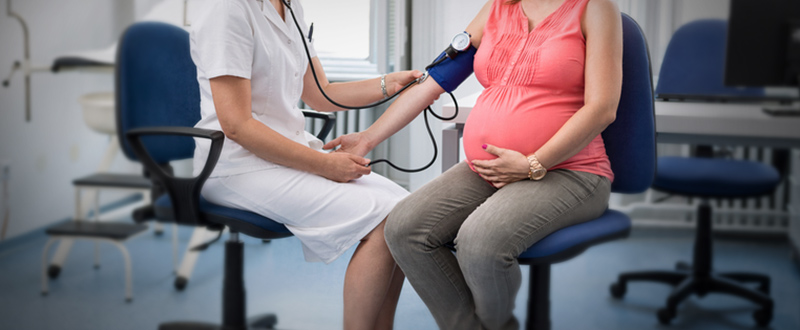Pregnancy is a unique and beautiful journey to motherhood. Although the memories last for a lifetime, the preparations to welcome a healthy baby start long before the delivery. In such a scenario, where the body is going through several changes, maintaining blood pressure can be an uphill task. If already diagnosed with high blood pressure, it can prove to be fatal unless monitored regularly. Even then, there is a possibility of health complications for the mother and the unborn baby.Before we move on to the precautions, let us learn how to track blood pressure during pregnancy, how it can be measured, and blood pressure values that are considered normal, high, or low.
There are two values of blood pressure: systolic (when your heart is beating) and diastolic (when your heart is at rest). The higher value denotes systolic blood pressure, and the lower one indicates diastolic blood pressure.
During pregnancy, your blood pressure is measured at every visit to the doctor. When the value is equal to or less than 140/90 mmHg, it is considered as normal blood pressure. When the blood pressure increases above 140/90 mmHg i.e. the systolic value is above 140 mmHg, and/or the diastolic value is above 90 mmHg – it is considered as high blood pressure (hypertension). High blood pressure is a cause for worry especially during pregnancy, where it can be dangerous for both mother and child.
Blood pressure in pregnancy can be higher as well as lower than the normal.
Low Blood Pressure
As for low blood pressure, there is no precise number to look out for, but if you notice any of the following symptoms, you need to consult your doctor right away. Symptoms may include:
 Lightheadedness
Lightheadedness Nausea
Nausea Dizziness / Giddiness
Dizziness / Giddiness Cold, Clammy Skin
Cold, Clammy Skin Shallow, Rapid Breathing
Shallow, Rapid Breathing Blurred Vision
Blurred Vision Increased Thirst
Increased Thirst
Causes of low blood pressure may be multiple, but a few important ones are listed below.
- Allergic Reactions
- Infections
- Prolonged Bedrest
- Dehydration
- Malnutrition
- Internal Bleeding
- Anemia (Low Hemoglobin Levels)
- Heart Conditions
- Endocrine Disorders
- Ectopic Pregnancy (Pregnancy Occurring in Other Sites Than The Womb)
- Standing Up Too Quickly
High Blood Pressure
There are several possible causes of high blood pressure during pregnancy, and they include the following:
 Age (If You’re Above 35 Years)
Age (If You’re Above 35 Years) First-time Pregnancy
First-time Pregnancy Family History of Pregnancy-related High Blood Pressure (Pregnancy-induced Hypertension)
Family History of Pregnancy-related High Blood Pressure (Pregnancy-induced Hypertension) Diabetes And Other Autoimmune Diseases
Diabetes And Other Autoimmune Diseases Obesity
Obesity Sedentary Lifestyle
Sedentary Lifestyle Smoking
Smoking Alcohol Intake
Alcohol Intake Assistive Reproductive Technology Like IVF
Assistive Reproductive Technology Like IVF
These are the risk factors for high blood pressure during pregnancy and can eventually cause health complications if you do not seek immediate medical help or guidance.
There are three different types of high blood pressure conditions that a woman may encounter during pregnancy.
- Chronic Hypertension:
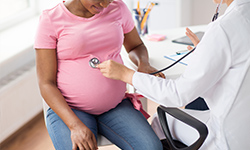 Chronic hypertension refers to a pre-existing high blood pressure condition, even before pregnancy, the one that is diagnosed within the first 20 weeks of pregnancy, or does not resolve by the 12-week after delivery. It is treated with medications.
Chronic hypertension refers to a pre-existing high blood pressure condition, even before pregnancy, the one that is diagnosed within the first 20 weeks of pregnancy, or does not resolve by the 12-week after delivery. It is treated with medications. - Gestational Hypertension:
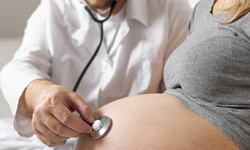 It is a type of hypertension (BP levels ≥140/90 mmHg on two different times, usually 4 hours apart) that develops after the 20th week of pregnancy in a woman with previously normal blood pressure and without proteinuria (loss of proteins in the urine).
It is a type of hypertension (BP levels ≥140/90 mmHg on two different times, usually 4 hours apart) that develops after the 20th week of pregnancy in a woman with previously normal blood pressure and without proteinuria (loss of proteins in the urine). - Chronic Hypertension with Superimposed Preeclampsia:
 Women with chronic hypertension before pregnancy can develop preeclampsia, a condition that occurs when women experience protein in their urine or additional health complications (such as impaired kidney function, accumulation of fluid in lower limbs and lungs, or new-onset headache) as the pregnancy progresses.
Women with chronic hypertension before pregnancy can develop preeclampsia, a condition that occurs when women experience protein in their urine or additional health complications (such as impaired kidney function, accumulation of fluid in lower limbs and lungs, or new-onset headache) as the pregnancy progresses.
What Are The Reasons for High Blood Pressure Changes During Pregnancy?
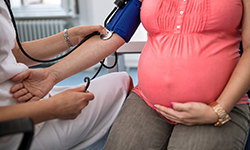 The primary reason behind blood pressure fluctuations during pregnancy is the fact that the amount of blood in a woman’s body increases, by about 45%, according to one study. Therefore, the pumping of blood to the rest of the body increases by a significant margin. Since the left ventricle (left side of the heart) does most of the pumping of blood, it becomes thicker than usual. It makes the heart work harder to pump all the extra blood in the body. The kidneys retain excess water due to the release of vasopressin (a hormone that helps reabsorb water from kidneys) in increased amounts.
The primary reason behind blood pressure fluctuations during pregnancy is the fact that the amount of blood in a woman’s body increases, by about 45%, according to one study. Therefore, the pumping of blood to the rest of the body increases by a significant margin. Since the left ventricle (left side of the heart) does most of the pumping of blood, it becomes thicker than usual. It makes the heart work harder to pump all the extra blood in the body. The kidneys retain excess water due to the release of vasopressin (a hormone that helps reabsorb water from kidneys) in increased amounts.
Given its temporary nature, in case of high blood pressure during pregnancy, it usually decreases post delivery of the baby. If the blood pressure remains high, your doctor will prescribe high blood pressure medication to lower its value.
Avoiding these pregnancy-related blood pressure conditions is possible if you regularly monitor your blood pressure. You can track your blood pressure in-between your doctor visits with the help of a digital blood pressure monitor, available at a pharmacy near you.
Other than regularly monitoring your blood pressure during pregnancy, you can take the following precautions.
PREVENT HIGH BP DURING PREGNANCY WITH THESE PRECAUTIONARY MEASURES
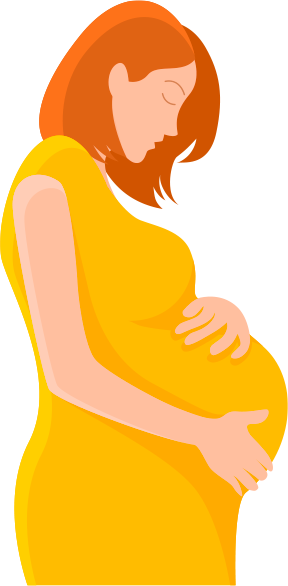




 Practice regular
Practice regular
exercise and adopt
a healthy diet
 Plan your daily diet
Plan your daily diet
by consulting a
qualified nutritionist
appointed by your doctor
 Quit smoking
Quit smoking
and alcohol
 Practice stress
Practice stress
management techniques
like Yoga and Meditation
to balance hormonal
shifts and physical stress
You can check out other stress management techniques to lower high blood pressure, right here: Stress Management: An Essential Lifestyle Change To Control High BP.
In general, careful monitoring of blood pressure and specific lifestyle changes can lower your risk of developing health complications due to high blood pressure during your pregnancy. If you notice signs and symptoms of high blood pressure or have the slightest suspicion, visit your doctor at the earliest to avoid any life-threatening complications for yourself and your baby. Just maintain a healthy lifestyle with regular physical activity for a smooth pregnancy and delivery. If you have any more questions, feel free to get in touch with an expert doctor nearest to you. Use our “Find a physician” service to get in touch with a doctor immediately.
Note of Caution: This article is for information purposes only. Always consult your doctor in case of any blood pressure or other health-related problems.
Disclaimer
The information contained in this article is to educate, spread awareness in relation to hypertension and other diseases to the public at large. The contents of this article are created and developed by BPinControl.in through its authors, which has necessary, authorisations, license, approvals, permits etc to allow usage of this articles on The Website. The views and opinions expressed in this article are views, opinions of the respective authors and are independently endorsed by doctors. Although great care has been taken in compiling and checking the information in this article, The Website shall not be responsible, or in any way liable for any errors, omissions or inaccuracies in this article whether arising from negligence or otherwise, or for any consequences arising therefrom. The content of this article is not a substitute for any medical advice. The Website shall not be held responsible or liable for any consequence arising out of reliance on the information provided in the article.
